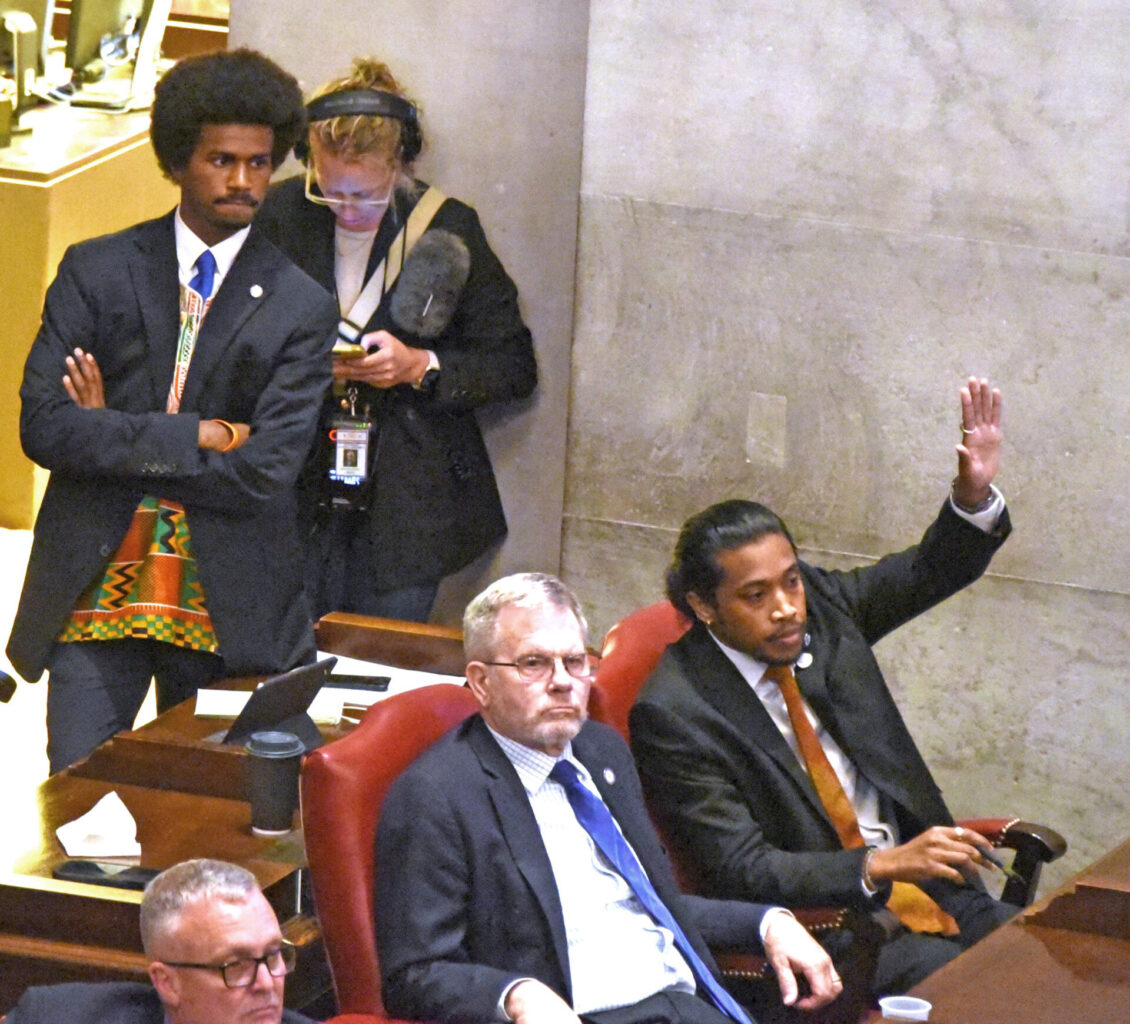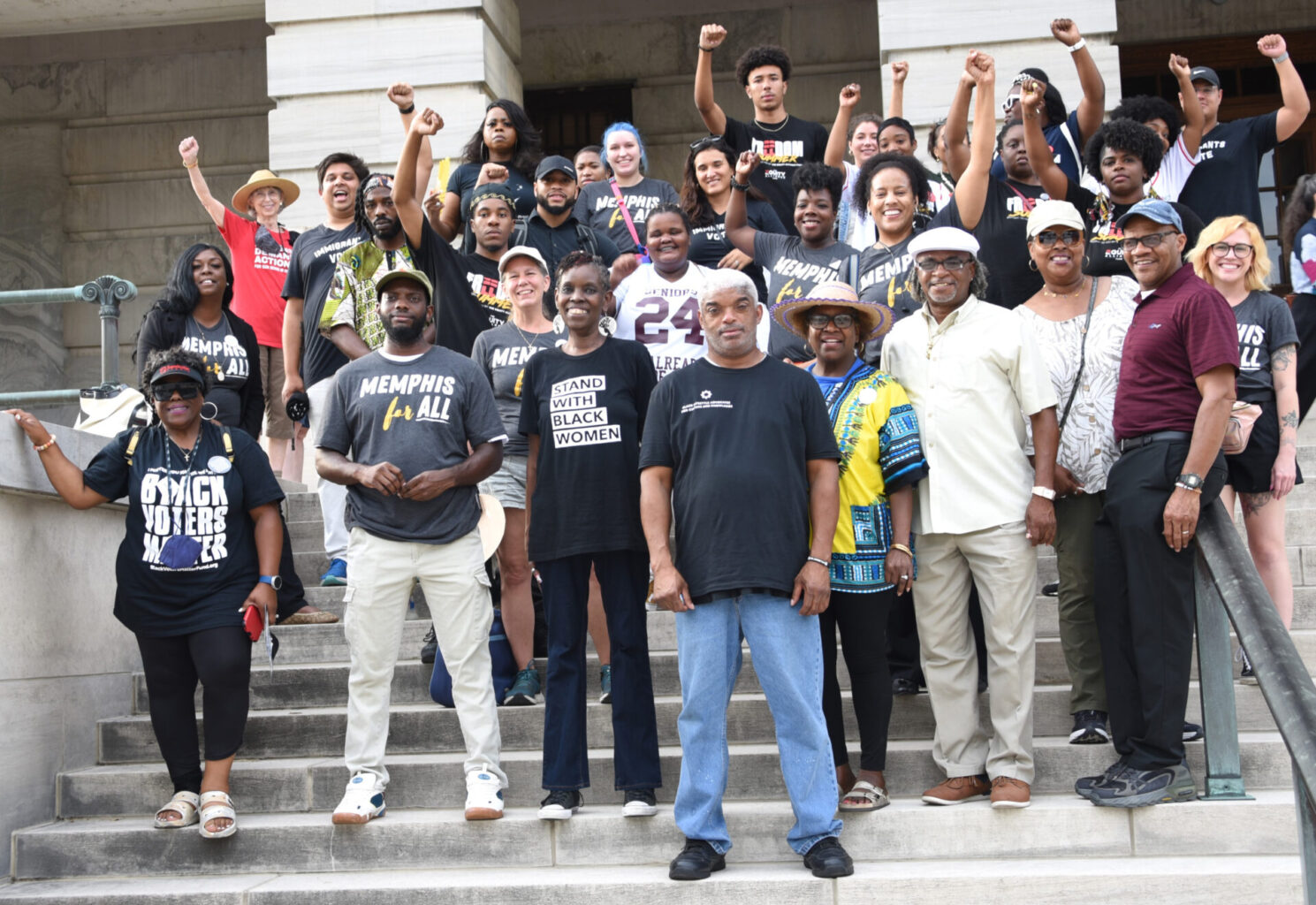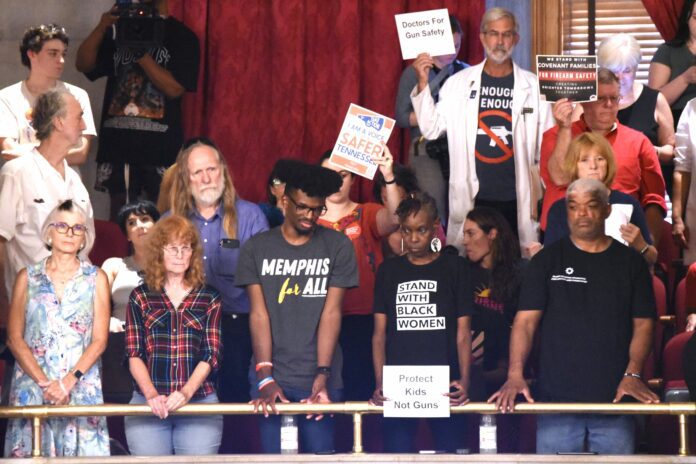NASHVILLE – Shaking violently between sobs, parent Sarah Shoop Neumann could only manage a whisper as state troopers escorted her out of a Tennessee legislative hearing where she was waiting to testify against a bill that would let teachers carry guns.
“I was supposed to speak. I was supposed to testify,” said Neumann, whose son still attends an elementary school where six people — including three 9-year-old children – were fatally shot this year.
Moments earlier, a Republican subcommittee chairman ordered law enforcement to clear the public out of the room after the crowd erupted into applause and others defied a new ban on holding signs during committee proceedings. Only after troopers cleared the room was Neumann allowed to return to testify.
While acts of protest big and small are common in legislatures, states often have rules in place to limit disruptions to government proceedings, with authorities given wide latitude to remove people who jeer, chant or are otherwise seen to interrupt debates.
People who go to capitols to voice their opinions often face a varied set of regulations that limit the display of signs, political messaging on clothing and even where people can gather, with penalties ranging from expulsion to criminal charges.
In some cases, lawmakers have pursued policies that effectively limit acts of protest, such as requiring people to get permission before protesting, leading to legal resistance and criticism that lawmakers are trying to tamp down on dissent and free speech rights.
“These kinds of rules limit our ability to communicate directly with our elected representatives who are supposed to be reacting to these views,” said Vera Eidelman, staff attorney with the ACLU Speech, Privacy & Technology project. “They make it more difficult for the public to have an impact on the legislation that will very much impact them.”
Tennessee provides the latest example, where a judge took swift action to block the new GOP-approved rule to penalize disruptive lawmakers and ban the public from holding signs during government proceedings. State officials are fighting to uphold the ban.
Neumann was among the grieving families that had come to the Tennessee Capitol this week for a special session that many of them hoped would address gun laws after the shooting at The Covenant School. She has spent the past five months attempting to win over hesitant lawmakers.
The hundreds of families, community organizers and advocates who have shown up to the Republican-dominated Legislature have been met with an enhanced law enforcement presence and found large sections of the building roped off – forcing many to be turned away from watching their government at work.
“I think this is a dangerous step that we are taking,” said Democratic Rep. Jason Powell, who represents Nashville. “I thought it was a dangerous step when I saw the halls of the chamber and saw more people with batons than people who are here to fight for justice.”
Similar policies elsewhere have faced legal pushback. A law in Georgia that blocks disruptive protests at government buildings is being legally challenged. A federal judge in Mississippi has recently blocked a law that requires permission from state police for protests or other gatherings near state government buildings in the capital city.
Earlier this year, Tennessee Republicans attracted national attention for expelling two young Black Democratic lawmakers for breaking House rules during a demonstration in support of gun control.

During this week’s special session in Tennessee, the existing political tensions were only enhanced when the Republican-dominated House established the new policy on signs and disruptive lawmakers. Protesters were quick to test the boundaries of the new parameters.
“Rules exist for two reasons: One is to provide order and second, to promote civility,” said Republican Rep. Gino Bulso. “These rules do that exceptionally well.”

Joe Cohn, legislative and policy director at the Foundation for Individual Rights and Expression, said it is understandable for the government to impose rules that allow officials to carry out their duties but added that the policies must be carefully calibrated with the public’s free speech rights.
“The most important thing to remember is that when the government imposes rules on members of the public who wish to observe official proceedings, those rules have to be reasonable and they have to be content and viewpoint neutral,” said Cohn.
At the Georgia Statehouse, protestors risk criminal charges under a state law that prohibits disruptive protests in the state’s Capitol and adjoining buildings, although the law’s constitutionality is being challenged following recent arrests of protestors. Charges were later dropped by county prosecutors.
A Democratic state lawmaker and other protestors sued over the law in federal court in 2020, arguing that it is overly broad and violates the First Amendment. The Georgia Supreme Court ruled in 2006 that a similar law meant to bar disruption of public meetings was unconstitutionally vague.
Despite questions about the law’s constitutionality, frequent protesters at Georgia’s Capitol are mindful of the law. For example, Democrats staging a sit-in over a recent voting law left an aisle open on the stairway that they sat on, because fully blocking it could have triggered their arrest.
This year, the majority-white and Republican-led Mississippi Legislature passed a bill to require state-issued permits for protests in parts of Jackson, the capital city, which is majority-Black and governed by Democrats.
In effect, the law would require people to obtain permission from state law enforcement officials for any protest near the statehouse, Governor’s Mansion or other state government buildings in the capital city. A federal judge blocked the law in a ruling that said it would have a chilling effect on First Amendment rights.
There was already a scheduling process for people who wanted to have events in and around the Capitol, but the law would have given broader authority to the state over issuing permits for protests or other large gatherings in other parts of downtown Jackson.
Many statehouses also have rules around the display of political signs, with policies not allowing banners or signs to be displayed in legislative chambers but granting permission for people to have them in common areas like rotundas.
Kansas allows handheld signs inside the building during protests, but not sticks with those signs — even though state law permits people to carry concealed guns in the building.
Those policies were set separately, but state Rep. Kyle Hoffman, a western Kansas Republican, said, “Concealed carry is a passive defensive weapon.”
“A stick, I think, would be more considered offensive,” he added.
(This Associated Press story is by Kimberlee Kruesi, Jeff Amy and Anthony Izaquirre. Amy contributed from Atlanta and Izaguirre contributed from Albany, New York. AP statehouse reporters contributed from across the United States.)



